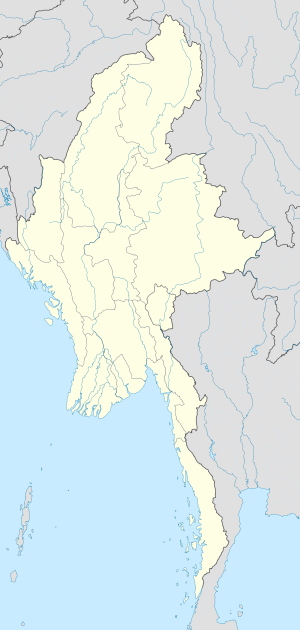| Battle of Prome | |||||||
|---|---|---|---|---|---|---|---|
| Part of the First Anglo-Burmese War | |||||||
Location and year of the major battles of the First Anglo-Burmese War, and Ava, the Court of Kingdom of Burma | |||||||
| |||||||
| Belligerents | |||||||
| British Empire | Kingdom of Burma | ||||||
| Commanders and leaders | |||||||
| Gen. Archibald Campbell, Willoughby Cotton |
Maha Ne Myo † Mauk-Me Sawbwa † Minhla Minkhaung | ||||||
| Strength | |||||||
| 3,000 Europeans and 2,000 Indians | ~13,000 soldiers[1] | ||||||
The battle of Prome was a land-based battle between the Kingdom of Burma and the British Empire that took place near the city of Prome, modern day Pyay, in 1825 as part of the First Anglo-Burmese War. It was the last-ditch effort by the Burmese to drive out the British from Lower Burma. The poorly equipped Burmese army despite the advantage in numbers suffered a defeat. The British army's subsequent march toward north threatened Ava, which led to peace negotiation by the Kingdom of Burma.
Following the defeat at Danubyu and the death of General Maha Bandula, King Bagyidaw ordered the general Maha Ne Myo to capture Prome with an army. With superiority in number, the Burmese army divided into three divisions and positioned themselves around Prome in Simbaik, Napadi hills, and the western shore of Irrawaddy river. The Burmese army harassed the British position in outlying regions around Prome by leading small raids but did not commit to an attack on Prome itself.
The British army, led by Gen. Archibald Campbell, composed of several regiments of Royal Foot infantry and Madras Native infantry and artillery. On 1 December 1825, General Campbell initiated an attack on the left division led by Maha Ne Myo, while distracting the centre division with a cannon barrage. The left division was stormed with a bayonet charge led by Lt. General Willoughby Cotton and a follow-up attack by General Campbell caused a complete rout of the left division of the Burmese army. The British army attacked the center division on the Napadi hills the following day, and due to the bravery of the Native infantry, drove the Burmese troops from the hills. An attack on the right division, situated on the western shore of Irrawaddy river, caused a general retreat of the Burmese army.
- ^ Hteik Tin Htwe, p. 336
